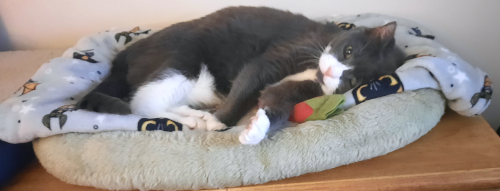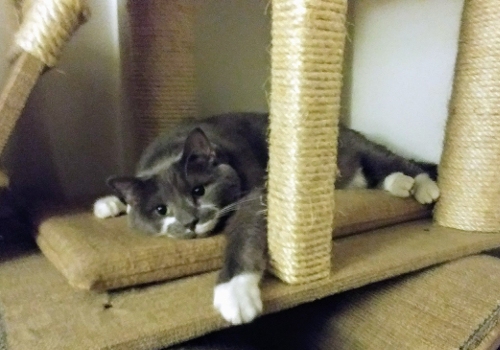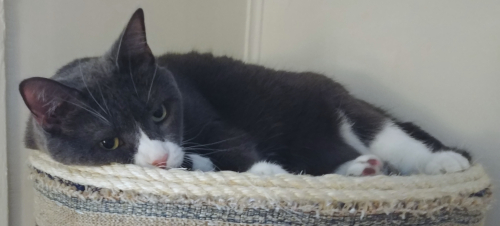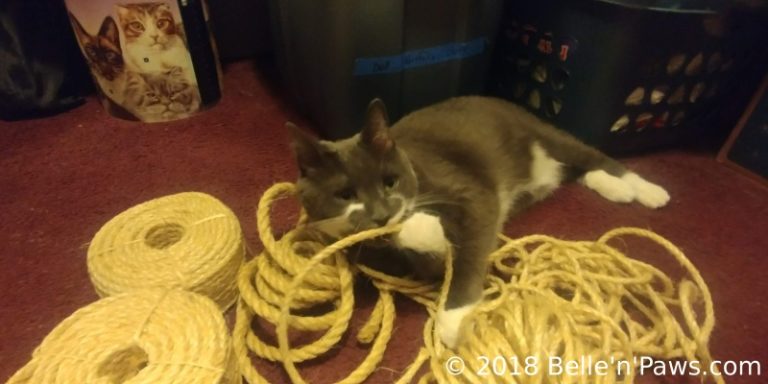Looking for our Senior Cat Age Calculator?
 The age at which a cat is considered a senior is about 11 years old and above. Both the American Association of Feline Practitioners (AAFP) and International Cat Care (ICC) would seem to agree with that. Then with cats over 15 years old are considered geriatric in some circles but we’re calling them “Super Seniors”. Both Belle and Paws are “Super Seniors”.
The age at which a cat is considered a senior is about 11 years old and above. Both the American Association of Feline Practitioners (AAFP) and International Cat Care (ICC) would seem to agree with that. Then with cats over 15 years old are considered geriatric in some circles but we’re calling them “Super Seniors”. Both Belle and Paws are “Super Seniors”.
It is important to note that these are just general guidelines, and individual cats may age at different rates. Some cats may show signs of aging earlier or later than others. Aging is a highly individual process influenced by genetics, lifestyle, nutrition, and overall health. If you are concerned about your cat’s age, it is always best to consult with your veterinarian.
Signs Your Cat May be Getting Older
As cats age, their bodies undergo significant transformations that extend far beyond just growing older. There are a few signs you can spot that indicate your cat may be entering its senior years. Your cat may have a decreased activity level or have increased sleepiness. Decreased jumping ability is another sign. They may have slower movement and some reluctance to climb stairs or have stiff joints with potential arthritis development.
Most senior cats will exhibit increased sleeping and a decrease in play activity. There may be a change in vocalization. Every senior cat we’ve had saw an increase in vocalization with Belle and Paws being no different. Most seniors will also exhibit an increase in anxiety or neediness. We also saw this in Belle and Paws but more so in Belle.
You may see changes in appetite with weight gain OR loss and maybe some visible decreased muscle loss. Again, we see this in both Belle and Paws. There may be some changes in coat color. Both Belle and Paws saw a slight change in color that saw their grey shiny coat start to take on a red/brown hue in some areas. There may be some difficulty in grooming and a reduced ability to regulate their body temperature which means they’ll prefer warmer areas. Some cats will have increased changes in behavior like accidents outside the litter box or increased moodiness.
As mentioned, if you notice any of these signs as a significant change, it is important to take your cat to the veterinarian for a checkup. Your veterinarian can help you determine if your cat is healthy and aging normally, or if there may be an underlying medical condition that needs to be treated.
Veterinary Considerations
There are a number of things regarding veterinary considerations you can do to help your senior cat live a long and healthy life. These include regular health monitoring.
- Bi-annual comprehensive check-ups
- More frequent blood work
- Specialized senior cat panels
- Comprehensive physical examinations
Your cat may need critical health screenings like:
- Kidney function tests
- Thyroid hormone levels
- Diabetes screening
- Cardiac evaluations
- Comprehensive blood chemistry
- Urinalysis
Nutritional Needs
Providing a healthy diet tops the list and may include several differing factors like lower-calorie diets, increased protein quality, enhanced digestibility. They may need supplements that target joint health, cognitive function, immune support, increased moisture content and potentially special prescription diets.
Environmental Adaptations
With your cat growing older, you may need to start considering the environment they live in. For Belle and Paws there were several considerations we had to make in their environment. We had to make accommodations to their preferred sleeping areas. Not being to climb or jump down from certain areas was an adjustment for them and if you don’t change or remove these areas cats will sometimes hurt themselves to make sure they get there.
Low sided litter boxes may become a thing you have to shop for. Both Belle and Paws went from using multiple litterboxes to using just one and that one was on the ground and was easy to get in and out of.
You should reduce vertical challenges for the cat. We had several cat trees and had to restrict access to some of them because both Belle and Paws would put themselves in areas that were high and concerning for a senior cat. Cat’s may not like that you’ve restricted them but in our case both Belle and Paws found the new places we provided for them and adapted nicely.
If your cat grows long fur between their toes on on their paws, you may need to trim their hair for bare floors. Neither Belle nor Paws had this issue but we have had cats that would slide on their fur and it was difficult for them as they aged. Our cat Bubbles comes to mind here.
Cognitive Engagement
As your cat gets older you have to think about their cognitive abilities and their desire to engage with you. Just like a human’s brain, a cat’s brain also goes through changes as they age. Gentler play sessions are definitely in order. Your cat will likely not be flying around the house the way they used to and when you play with your cat you need to adjust your engagement with them. Plenty of exercise is a plus but not if it comes at a cost of hindered ability and depression.
Get them interactive toys and make consistent routines in quiet, predictable environments for them. Reduce stress triggers for them and increased patience and understanding of their aging process is a must. This will all help in your cat’s mental and emotional support as well. Understand your aging cat may have increased vulnerability, potential anxiety, a need for consistent comfort. They may also may have a reduced stress tolerance with a desire for quiet predictable interactions as time goes by.
Common Health Challenges
As a cat gets older, there are some common health challenges that many cats will go through at some point. Not all of cats will have difficulties that include all (or any) of these but it’s worth keeping an eye out for them so you’ll recognize the issue if it shows in your cat.
- Kidney Disease
- Chronic progressive condition
- Requires specialized diet
- Potential medication management
- Hyperthyroidism
- Metabolic disorder
- Can cause weight loss
- Treatable through medication or surgery
- Arthritis
- Causes mobility issues
- Pain management crucial
- Potential supplement interventions
- Dental Deterioration
- Increased risk of infections
- Potential pain
- Regular dental check-ups essential
- Cognitive Dysfunction
- Similar to human dementia
- Behavioral changes
- Potential medication support
While you monitor your cat’s health, you’ll want to watch their appetite for changes. Notice any change in their mobility as they grow older and if they have any pain while doing so (what is their pain level?). What’s their level of engagement with you and during playtime with their counterparts (if any). Can they still perform basic bodily functions like grooming, eating and going to the litter box. Are they happy overall?
Communication and Compassion
The most critical aspect of senior cat care isn’t medical – it’s compassion. Your aging feline companion has shared years of life with you. They deserve patience, understanding, and gentle care. Use soft speaking tones and a gentle touch. Show them there’s a consistent presence and show minimal disruption to their lives and of course respect for their changing needs.
Final Thoughts
Aging is not a disease – it’s a natural progression. With proper care, attention, and love, senior cats can continue to be vibrant, engaged companions who offer profound emotional connection. In the quiet moments of their golden years, cats teach us the most valuable lessons about grace, resilience, and unconditional love. By taking good care of your senior cat, you can help them live a long and happy life.
Looking for our Senior Cat Age Calculator?






